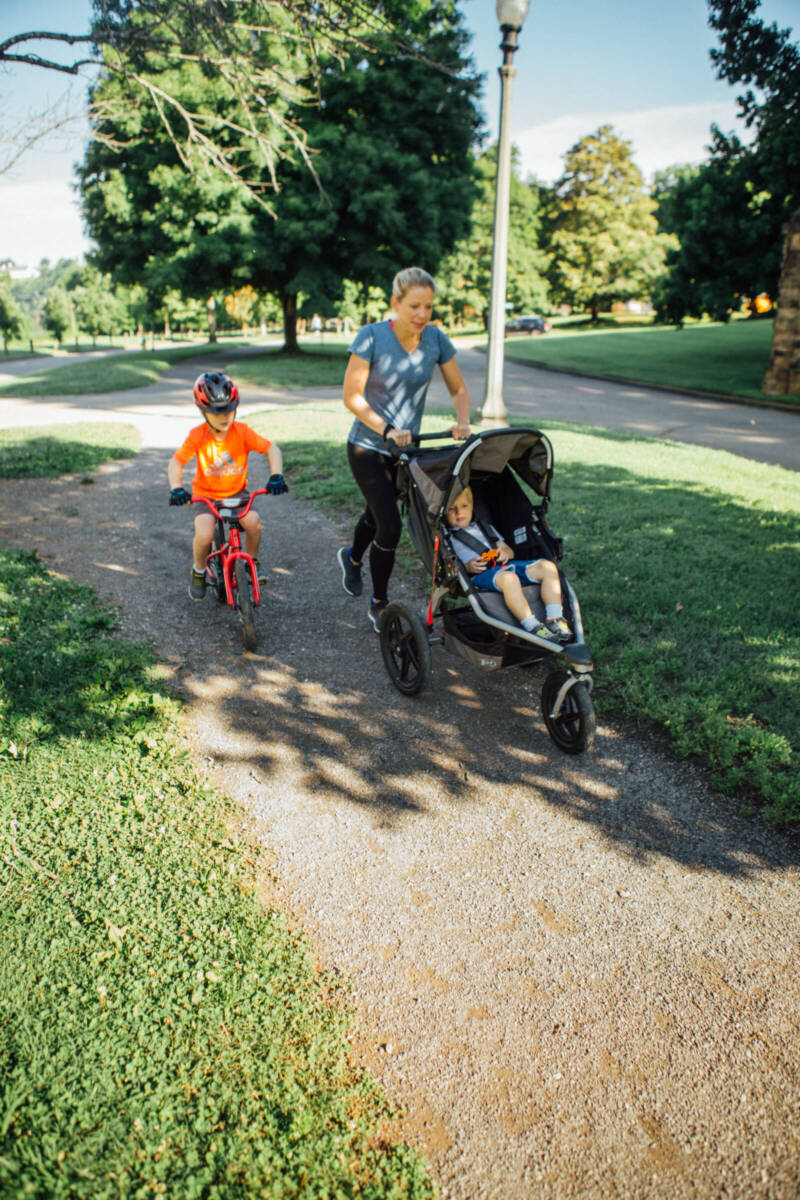Can Exercise Help Morning Sickness?
Morning sickness is a common symptom of being pregnant. This nauseous feeling can make doing anything feel miserable. But can exercise help morning sickness? Studies show that even though working out with morning sickness is the last thing you want to do, it may actually ease your nausea.

I spoke with fellow mother runners, experts, and consulted the research to find the best ways to cope with morning sickness so that you can stay active during your pregnancy. Many mother runners said just getting out the door helped them feel better. Others changed when and how they ate. Some said it was difficult to find relief.
I review different tips for how to exercise with morning sickness so you can stay active for the mental and physical health of you and your baby.
Skip Ahead:
Note: I’m a running coach, not a doctor. Talk to yours if you are struggling with morning sickness during exercise.
Does Exercise Help Morning Sickness?
But can exercise help morning sickness symptoms? There is evidence that gentle exercise does help with morning sickness. How?
Some research and anecdotal evidence from mother runners I have coached and in the mother runner community suggests that working out with morning sickness can promote blood flow which aids in digestion lessening the severity of morning sickness. Also, exercising with morning sickness may stimulate your appetite, helping you eat more. Finally, exercise with morning sickness can release endorphins which can fight both nausea and fatigue.
However, pregnant women suffering from morning sickness need to tread lightly. There is evidence that intense exercise could worsen nausea symptoms (especially at high altitude).
Also, if you are feeling weak from lack of nutrition or hydration, it is not recommended you go out and run hard. Taking steps such as eating smaller meals with bland foods, hydrating with sports drinks, and reducing your training volume can help mitigate morning sickness symptoms.
Understanding Morning Sickness
The exact cause of morning sickness isn’t known. Morning sickness during pregnancy is thought to be caused by the hormone Human Chorionic Gonadotropin which surges after you get pregnant to signal to the body to make more estrogen and progesterone to support pregnancy. It is also speculated that blood pressure fluctuations and changes in carbohydrate metabolism during pregnancy could be the culprit.
Morning sickness doesn’t just happen in the morning. Women who struggle with nausea during pregnancy can suffer from it around the clock, however, it is typically worse in the beginning of the day and in the first trimester. Up to 80 percent of pregnant women experience morning sickness symptoms which include:
- General sense of feeling like you need to vomit
- Vomiting
- Loss of appetite
- Feeling hungry but nothing sounds appealing (food aversion)
- Nausea from certain smells
Most women have their morning sickness resolve around week 12-14 of their pregnancy, however about 20 percent of pregnant women have pregnancy nausea into the second trimester. And some women struggle with vomiting throughout their pregnancy.
Severe morning sickness called hyperemesis gravidarum can be dangerous due to dehydration and weight loss. (Not to mention, it is miserable!). This type of severe morning sickness can be treated with medication prescribed by your OB Gyn.
Benefits of Exercise for Pregnant Women
So, why should you exercise with morning sickness? Because there are many benefits to working out during pregnancy. Here are just some of the benefits of exercise for pregnant women:
- Decreases morning sickness
- Improves mother’s overall health and self-esteem
- Quickens delivery and postpartum recovery
- Prevents lower back pain, pre-eclampsia, gestational diabetes, and excessive weight gain
- Increases energy and improves sleep
- Lowers the occurrence of Caesarean section, preterm birth, and high birth weight
- Improves baby’s brain development, brain mass, lean muscle mass, and exercise in adulthood
Best Exercises for Morning Sickness
Intense exercise when you’re struggling with morning sickness is not recommended. However, light exercise may be able to help lessen your pregnancy nausea symptoms.
Physical activity during pregnancy that is gentle on the body and stimulates blood flow can promote the above benefits of exercise without overly stressing your body.
The best exercises for morning sickness include:
- Walking or using run/walk intervals
- Swimming or aqua jogging
- Elliptical machine
- Stationary cycling
- Pilates
- Barre
- Yoga
Indeed, there are several stretches for nausea which aid in digestion and take pressure off the abdomen and diaphragm. Practice deep belly breaths when doing these poses in which you aim to expand your rib cage like an umbrella for 4-6 counts in and out.
Try these stretches for nausea:
Seated Spinal Twist:
Sit cross-legged on the floor. As you exhale, slowly twist your body to look over your right shoulder. Place your left hand on your right knee and your right hand behind your body. Breathe deeply and hold for a few seconds. Repeat on other side. Continue for as many rounds as feels good.
Child’s Pose:
Sit on your knees, with your knees hip width apart, and lean forward as your bottom touches your heels. Rest your forehead on the floor and reach your arms in front of your head in a long full body stretch. Hold for 30-120 seconds. Feel free to stretch your arms to either side to stretch your side body.
Legs Up on Wall:
Sit close to a wall and lie down. Put your legs up on the wall and move your bottom close to the wall so that you are in an L shape. Take deep breaths and stay there for a few minutes. This stretch is also great for a post-run recovery.
Other Tips for Exercising with Morning Sickness
If you want to keep exercising but morning sickness is getting in the way, there are steps you can take to manage your morning sickness.
- Eat simple foods every 1-3 hours. Favorites among fellow pregnant runners include saltines, Ritz crackers with ginger ale, graham crackers, bananas, and bagels. High-carb and high-protein snacks can help settle your stomach and make you feel fuller for longer. Experimenting with the amount, timing, types, textures, and temperatures of food can also help with food aversions.
- Hydrate well. Vomiting can dehydrate you so aim to drink water and electrolyte drinks such as Nuun or Liquid IV. Aim to bring hydration with you on all runs. Coconut water, ginger tea, and ginger ale can also ease nausea symptoms.
- Wear Acupressure bands. Traditional treatments for nausea such as wrist bands that utilize pressure points to decrease “sea sickness” or “car sickness” symptoms may help with morning sickness, studies show.
- Eat slowly. Slowing down your eating and chewing foods up to thirty times before swallowing can aid in digestion and prevent stomach upset caused by excess air intake. Drinking water before, during, and after eating can also help with digestion.
- Try peppermint oil. Massaging peppermint oil into your stomach may help reduce nausea, studies show, as it can relax muscles, calm nerves, and improve digestion.
- Acupuncture treatment using needles, has been found by multiple studies to be effective in treating nausea and dry retching in pregnant women.
- Reduce running volume. Running with nausea may be decreased if you try decreasing your volume (starting with 10 percent) and intensity. Try this and see how your body responds. Remember, your body is working extra hard to grow a baby, so it may need a step back elsewhere to allow it to do so.
- Connect with fellow fit pregnancy women. Talking with other fit pregnant women who are on a similar journey to you may help you feel less alone and more supported, and they may even offer tips that can help you.
- Talk to your doctor about vitamins and/or medication. Certain vitamins such as B6, OTC medications such as Meclizine and antihistamines, and prescribed medications like Zofran can help treat morning sickness. Talk to your OB-gyn about your treatment if this is a path you’d like to pursue. Also, consider taking your prenatal vitamins (folic acid) in the evening to avoid additional stomach upset.
Precautions for Exercise with Morning Sickness
Do not run or exercise if your morning sickness is so severe that you can’t eat or drink, or you feel weak, light-headed, or dizzy. If you begin exercising and still feel you are going to vomit, stop—and call your doctor.
Working Out in the First Trimester, Recapped
Working out in the first trimester is good for both you and your baby, but it does come with challenges such as fatigue and morning sickness. Thankfully there are ways to counteract these symptoms.
Some of these methods are worth trial and error. Indeed, some moms I spoke to found that jelly beans (with the pectin) eased nausea. Another like ginger beer over ginger ale. Others said Zofran was the other thing that worked.
Every pregnancy journey is unique, and it’s worth trying to find what works best for you and your body. Talking with fellow mother runners as well as your doctor may be able to help you feel most comfortable and stay the most active.
Did you experience morning sickness during your pregnancy?






